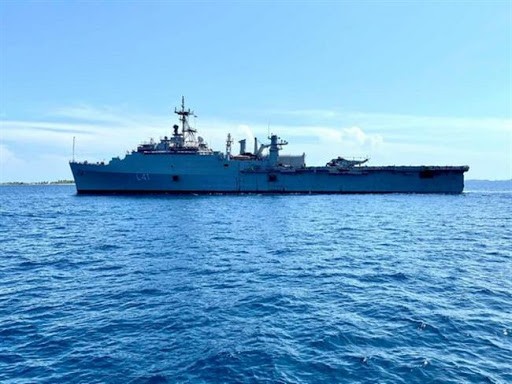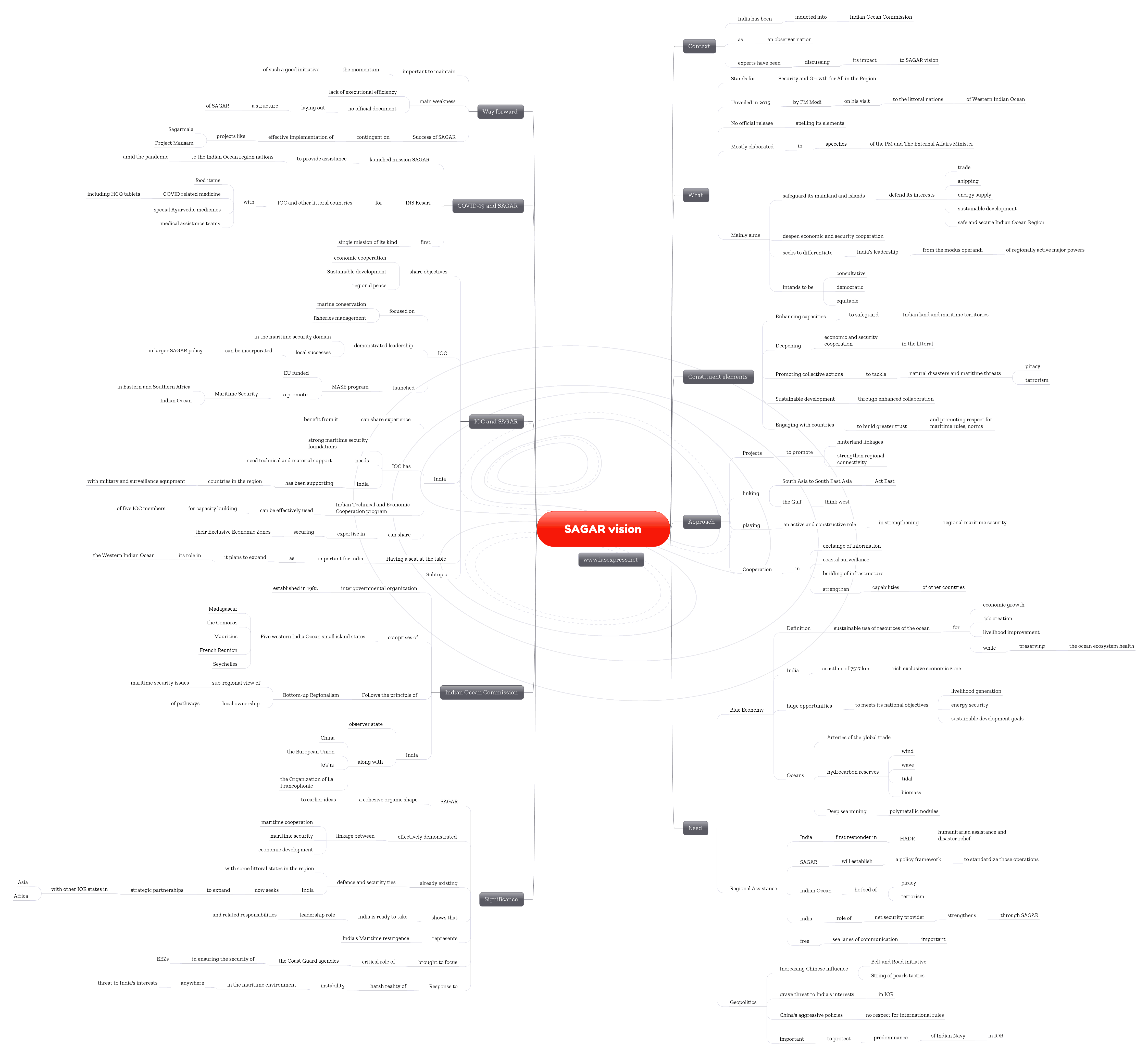SAGAR vision: Objectives, Approach, Current updates

India’s importance in the Indian Ocean region and rising recognition of the same was once again highlighted recently when it joined the Indian Ocean Commission as an observer. India being a predominant force in the Indian Ocean, joining this important organization lends much required depth to SAGAR vision of PM Narendra Modi.
This topic of “SAGAR vision: Objectives, Approach, Current updates” is important from the perspective of the UPSC IAS Examination, which falls under General Studies Portion.
What is SAGAR?
- SAGAR, which stands for ‘Security and Growth for All in the Region’, was unveiled in 2015 on the occasion of the commissioning of the Indian built Offshore Patrol Vessel (OPV) Barracuda in the service of the National Coast Guard of Mauritius.
- There is no official release spelling out its elements. The ideas of SAGAR must be understood from various Speeches form the PM and the External Affairs Minister
- According to this vision, India would do everything to safeguard its mainland and islands and defend its interests. The Indian interests in this region are safety and security of Indian shipping, fishing, seaborne trade, energy supply, assets, and resources in the maritime domain and Indian citizens who are working overseas.
- Further, India will also work to ensure a safe, secure, and stable Indian Ocean region (IOR).
- As per SAGAR, India seeks to deepen economic and security cooperation with its maritime neighbors and assist in building their maritime security capabilities.
- As it seeks to differentiate India’s leadership from the modus operandi of other regionally active major powers, SAGAR is intended to be consultative, democratic, and equitable.
What are the constituent elements of SAGAR?
- Enhancing capacities to safeguard Indian land and maritime territories and related interests.
- Deepening economic and security cooperation in the littoral.
- Promoting collective actions to tackle natural disasters and maritime threats like piracy, terrorism, and emergent non-state actors’ activities.
- Working towards a sustainable development of the region through enhanced collaboration.
- Engaging with countries beyond Indian shores to build greater trust and promoting respect for maritime rules, norms, and peaceful resolution of disputes.
How India seeks to implement this vision?
- India will engage in Projects to promote hinterland linkages and strengthen regional connectivity.
- Another aspect of this approach would be linking South Asia to South East Asia (Act East) and to the Gulf (Think West).
- Next playing an active and constructive role in strengthening regional maritime security will build trust among the states in the region.
- India would cooperate on the exchange of information, coastal surveillance, building of infrastructure, and strengthening other country capabilities.
What is the need for SAGAR policy?
- Blue Economy
- India has a coastline of 7517 km with a rich exclusive economic zone. In Blue economy India sees a huge opportunity to meets its national objectives of livelihood generation, energy security, sustainable development goals.
- World Bank defines Blue Economy as the sustainable use of resources of the ocean for economic growth, job creation, livelihood improvement while preserving the ocean ecosystem health.
- Oceans are
a) Arteries of the global trade as 80% of the route is through Oceans.
b) It has a huge energy potential with hydrocarbon reserves, sustainable energy options such as wind, wave, tidal, biomass energy generation potential.
c) India has an exclusive license for deep-sea mining for polymetallic nodules in the Indian Ocean given by the International Seabed Authority.
- Regional Assistance and developmental role
- India has successfully established itself as a first responder in disaster relief needs in the region with its humanitarian assistance measures. SAGAR will establish a policy framework through which the case to case basis initiative will be standardized.
- Indian Ocean region has been a hotbed of non-state actor activities such as piracy due to busy sea lanes of communications and terrorism has also sought to use oceans as new entry points.
- India’s role as a net security provider is important to maintain peace and security is necessary not only for itself but also for other small island states.
- Geopolitics
- Increasing Chinese influence in the region and its aggressive Belt and Road initiative poses a danger to India’s interests and larger international rule-based maritime cooperation. It has developed Gwadar port, has a naval base at Djibouti, and China is infamous for its disrespect of global norms with impunity.
- It is important to contain Chinese schemes in the Indian Ocean and most importantly its String of Pearls tactics.
- India must protect its strategic predominance in the Indian Ocean to maintain its strategic hold.
What is the significance of SAGAR?
- Though the policy is not entirely a break from the past, it was now presented as a cohesive organic whole for the first time.
- SAGAR effectively demonstrated the linkage between maritime cooperation, maritime security, and economic development.
- India had defence and security relations with some littoral states like Seychelles, Mauritius, and Maldives but as India now looks to expand strategic partnerships with other IOR states in Asia and Africa, SAGAR provides a mechanism to do so.
- SAGAR, after long passivity with respect to the littoral states, indicated to the leadership role and responsibilities India was ready to take in the region on a long-term basis in a transparent manner.
- SAGAR essentially represents India’s Maritime resurgence. After preceding actions like up-gradation of Look East policy to Act East Policy, Project Mausam, SAGAR was followed up with engaging Bangladesh with maritime cooperation as an area of focus, reinvigorating BIMSTEC, Project SAGARMALA, Naval cooperation and exercises with nations in larger Indo-Pacific shows India’s active role in the maritime region.
- SAGAR brought to focus the increasingly critical role the Coast Guard agencies will play in ensuring the security of their respective vast EEZs for facilitating economic activities based on the blue economy.
- SAGAR, finally, was a response to the harsh reality that instability in the maritime environment anywhere would not enhance India’s own maritime security and its national interests.
What is the Indian Ocean Commission (IOC)?
- It is an intergovernmental organization established in 1982.
- It comprises of Five western India Ocean small island states namely Madagascar, the Comoros, Mauritius, French Reunion, And Seychelles.
- It follows the principle of Bottom-up Regionalism which provides a sub-regional view of maritime security issues and local ownership of pathways for workable solutions.
- Having a seat at the table of IOC is important for India as it plans to expand its role in the Western Indian Ocean which strategically connects the Indian Ocean to the South-eastern African Coast and beyond.
- IOC already has four observers namely China, the European Union, Malta, and the Organization of La Francophonie.
How IOC observer status Srenghtens SAGAR initiative?
- IOC and SAGAR share objectives of economic cooperation, Sustainable development, regional peace, etc.
- Recently It has focused on marine conservation and fisheries management. India can share its experience and benefit from the small island states experience in this field.
- IOC has demonstrated leadership in the maritime security domain. With proper cooperation, local successes in curbing maritime threats can be incorporated in larger SAGAR policy.
- IOC is one of the four regional organizations to launch the EU funded MASE program to promote Maritime Security in Eastern and Southern Africa and the Indian Ocean.
- IOC has strong maritime security foundations but they need technical and material support. India has been supporting littoral nations with military and surveillance equipment.
- India’s Indian Technical and Economic Cooperation program can be effectively used for the capacity building of five IOC members.
- India can also share its expertise in securing their Exclusive Economic Zones.
COVID-19 and SAGAR
- India has launched mission SAGAR to provide assistance to the Indian Ocean region nations amid the pandemic.
- Under the mission, Indian Naval Ship Kesari has departed for the IOC nations and other Indian ocean littorals to provide food items, COVID related medicine including HCQ tablets, special Ayurvedic medicines, and medical assistance teams.
- This is the first time that a single mission is launched to assists all western Indian Ocean small island states.
Way Forward
- India has been increasing its presence in the IOC region through proactive measures but it is important to maintain the momentum.
- India’s main weakness has been execution where its competitors fare better. It has a very slow and weak execution record.
- SAGAR till now has no official document. This itself shows an inability in executing good ideas. India should come over this weakness.
- The success of SAGAR is contingent on the effective implementation of projects like Sagarmala, Project Mausam, and other flagship projects in regional engagement.
Conclusion
SAGAR propels maritime issues to the center of India’s foreign policy and fills a serious policy vacuum and highlighted a critical interlink between maritime security, maritime cooperation, and blue economy. It must be institutionalized and actively pushed to create a rule-based maritime order in the Indian Ocean region. An observer status at IOC is a step in that direction.
Practice Question for Mains
Elucidate the significance of observer status at the Indian Ocean Commission in taking forward the SAGAR vision. (250 words)
https://maritimeindia.org/View%20Profile/636602941847320911.pdf
https://thewire.in/diplomacy/india-approved-as-observer-of-indian-ocean-commission
https://www.defenceaviationpost.com/2020/05/india-is-an-emerging-maritime-power-rajnath-singh/
https://www.thehindu.com/sci-tech/science/why-is-india-pulled-to-deep-sea-mining/article28809029.ece


